Recognizing The Effects Of Neck And Back Pain On Your Wellness: Regularly Experienced Problems And Their Signs And Symptoms
Recognizing The Effects Of Neck And Back Pain On Your Wellness: Regularly Experienced Problems And Their Signs And Symptoms
Blog Article
Short Article Composed By-Hamilton Butcher
If you're experiencing neck and back pain, your body may be attempting to tell you something more than simply pain. The method your back feels can provide important ideas about your total wellness. Understanding the specific sort of discomfort you're feeling and any kind of going along with symptoms is crucial to deciphering the secret behind your discomfort. Let's discover the usual conditions and symptoms related to different sorts of neck and back pain to clarify what your body may be signaling.
Kinds Of Neck And Back Pain
When it comes to neck and back pain, there are numerous kinds that you may experience. One typical type is muscle mass discomfort, frequently brought on by overuse, strain, or injury to the muscles and tendons sustaining the back. This type of discomfort can vary from moderate pain to severe and incapacitating discomfort.
An additional type is nerve discomfort, which can result from problems like herniated discs or sciatic nerve pain. Nerve discomfort usually presents as a sharp, shooting experience that radiates down the leg.
Joint discomfort in the back can stem from concerns like arthritis or sacroiliac joint dysfunction. This sort of discomfort is typically felt in the lower back and can be exacerbated by particular activities.
Additionally, back pain can be related to structural troubles such as spine stenosis or vertebral cracks. Recognizing the type of pain in the back you're experiencing is essential in determining the ideal therapy and management methods.
Common Symptoms to Watch For
Relocating past the various sorts of pain in the back, it's important to recognize the common signs and symptoms that can signal underlying problems.
Persistent pain in the back that worsens with motion or in the evening might indicate an extra major trouble. Tingling or prickling in the legs or feet, particularly when accompanied by weak point, could point to a nerve-related problem. If you experience unexpected weight-loss in addition to pain in the back, it could be a sign of a much more systemic condition.
https://andresjezsm.blogginaway.com/32726166/a-newbie-s-overview-to-comprehending-cervical-back-anatomy-and-its-influence-on-neck-discomfort to any type of adjustments in bladder or digestive tract function, as this could be linked to spine compression. Fever, chills, or evening sweats combined with neck and back pain may signify an infection. Keep an eye out for pain that radiates down one or both legs, possibly a sign of sciatica.
Health Conditions Linked to Pain In The Back
If you experience back pain, it's critical to comprehend the potential wellness problems connected to this pain. just click the following web page in the back can be a signs and symptom of numerous underlying concerns, including muscle stress, herniated discs, osteo arthritis, spine stenosis, and even conditions like kidney stones or infections.
Muscle mass stress prevail and frequently arise from lifting heavy objects or sudden movements.
Herniated discs occur when the soft tissue in between vertebrae protrudes, causing nerve inflammation.
Osteoarthritis, a degenerative joint illness, can lead to neck and back pain as cartilage wears down.
Spine stenosis, the constricting of the spine canal, can put pressure on nerves.
how long does it take to be a chiropractor may cause intense pain in the back if they relocate into the urinary system.
Infections like spinal osteomyelitis can also manifest as pain in the back. Comprehending these possible health problems can assist you seek suitable healthcare and administration for your neck and back pain.
Final thought
So, following time your back harms, take note of the sort of discomfort and going along with signs. https://www.healthcentral.com/article/fitness-with-ankylosing-spondylitis could be a signal from your body concerning underlying health conditions like muscle mass pressure, nerve issues, joint problems, or even structural concerns. By recognizing these signs, you can take positive steps to address the root cause of your pain in the back and improve your total health and wellness and well-being.
